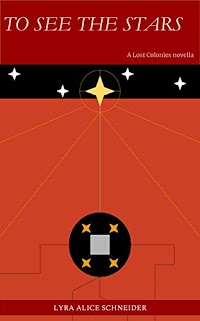
★★★☆☆ Mixed
(Lost Colony; Lost Colonies) Naavalah hesitates to call for help when she crash lands on a lost colony because she knows the Federation will destroy the local culture, but as she learns more about the local culture, she has second thoughts. (22,130 words; Time: 1h:13m)
Although this story will obviously have a sequel, it stops at a good place, with the biggest issues resolved.
"To See the Stars," by Lyra Alice Schneider [bio] (edited by Lyra Alice Schneider), published on January 13, 2019 by Amazon.com.
Mini-Review (click to view--possible spoilers)
Review: 2019.249 (A Word for Authors)
Pro: The bulk of the story is about Naavalah and Melis(te) trying to understand each other and develop mutual respect. There’s a delicious irony in the fact that Naavalah, a cis woman, puts much more store in politically correct rules for talking about gender than Melis(te), a genderfluid person in an intolerant society, does. Melis(te) does suffer, but s/he is cheerfully practical, consistently throwing Naavalah for a loop, e.g. when she deliberately misgenders herself (in Naavalah’s eyes) to make it easier to sneak into the Lord’s palace.
Naavalah often seems hopelessly inflexible, but her concerns about what will happen to Arciel if the Federation comes are deadly serious, and it’s clear Melis(te) and Rosalie simply don’t get it, so the burden falls on her alone. Her decision to work with the people on Arciel to help them raise their tech level to better deal with the Federation when it eventually arrives makes total sense, even though it violates some of her values. Her speech to the priests is the emotional high point of the story, partly because it’s an exercise of power, but mostly because she’s finally chosen to do something, and, based on what we’ve learned, it feels like the right decision.
Con: The biggest problem with the story is that the back-and-forth between Melis(te) and Naavalah at the beginning stops the action for much too long. Obviously the contrast and contradictions between the two are critical to the plot, but the setup takes up almost half the story at a point where the need for action seems urgent.
Naavalah’s obsession with pronouns makes her seem like she’s not really from the Federation at all; she talks like someone from our time dropped into the story. To her, transphobia ought to be something you read about in books, not something you expect to find in real life, but she’s got a hair trigger response to it, just like someone who grew up in a world (like ours) that was thick with it. Contrast her with Melis(te), who is an actual victim of transphobia but is far more relaxed about it.
Even Melis(te) sometimes has thoughts or dialogue that are so sensitive they sound out-of-character, though in general she comes across as a believable product of her world.
A smaller issue is that, given that the Federation is so squeamish that it doesn’t even let people own animals--much less eat them--it’s rather hard to believe they’d be so callous that they’d kill millions of people over cultural issues.
Other Reviews: Search Web, GoodReads.com
Lyra Alice Schneider Info: Interviews, Websites, ISFDB, FreeSFOnline
Follow RSR on Twitter, Facebook, RSS, or E-mail.
Pro: The bulk of the story is about Naavalah and Melis(te) trying to understand each other and develop mutual respect. There’s a delicious irony in the fact that Naavalah, a cis woman, puts much more store in politically correct rules for talking about gender than Melis(te), a genderfluid person in an intolerant society, does. Melis(te) does suffer, but s/he is cheerfully practical, consistently throwing Naavalah for a loop, e.g. when she deliberately misgenders herself (in Naavalah’s eyes) to make it easier to sneak into the Lord’s palace.
Naavalah often seems hopelessly inflexible, but her concerns about what will happen to Arciel if the Federation comes are deadly serious, and it’s clear Melis(te) and Rosalie simply don’t get it, so the burden falls on her alone. Her decision to work with the people on Arciel to help them raise their tech level to better deal with the Federation when it eventually arrives makes total sense, even though it violates some of her values. Her speech to the priests is the emotional high point of the story, partly because it’s an exercise of power, but mostly because she’s finally chosen to do something, and, based on what we’ve learned, it feels like the right decision.
Con: The biggest problem with the story is that the back-and-forth between Melis(te) and Naavalah at the beginning stops the action for much too long. Obviously the contrast and contradictions between the two are critical to the plot, but the setup takes up almost half the story at a point where the need for action seems urgent.
Naavalah’s obsession with pronouns makes her seem like she’s not really from the Federation at all; she talks like someone from our time dropped into the story. To her, transphobia ought to be something you read about in books, not something you expect to find in real life, but she’s got a hair trigger response to it, just like someone who grew up in a world (like ours) that was thick with it. Contrast her with Melis(te), who is an actual victim of transphobia but is far more relaxed about it.
Even Melis(te) sometimes has thoughts or dialogue that are so sensitive they sound out-of-character, though in general she comes across as a believable product of her world.
A smaller issue is that, given that the Federation is so squeamish that it doesn’t even let people own animals--much less eat them--it’s rather hard to believe they’d be so callous that they’d kill millions of people over cultural issues.
Other Reviews: Search Web, GoodReads.com
Lyra Alice Schneider Info: Interviews, Websites, ISFDB, FreeSFOnline
Follow RSR on Twitter, Facebook, RSS, or E-mail.
No comments (may contain spoilers):
Post a Comment (comment policy)